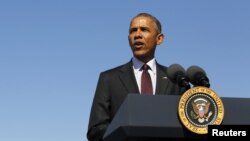President Barack Obama says the framework nuclear deal reached with Iran is a "good deal" that was reached through "tough, principled diplomacy."
Iran has agreed to "not stockpile" the materials needed to build a weapon, Obama said in his weekly address Saturday. The president noted that "international inspectors will have unprecedented access to Iran's nuclear program because Iran will face more inspections than any other country.
"If Iran cheats, the world will know it. ... This deal is not based on trust, it's based on unprecedented verification."
Iran's President Hassan Rouhani said the framework agreement reached with world powers would protect Iran's nuclear rights and provide relief from international sanctions.
In a televised address to the nation Friday, Rouhani said the agreement was an acceptance of Iran's right to enrich uranium on its own territory for peaceful purposes. He said centrifuges have to "spin," while "people's lives and the economy have to move forward."
He also said the development of Iran's nuclear program posed no threat to other countries.
Pledge to abide by terms
The Iranian president vowed that Iran would honor all of its pledges in the agreement "as long as the other side honors its promises as well."
The framework deal reached Thursday between Iran and six world powers is designed to provide relief from international sanctions in exchange for curbs on Tehran's nuclear program. The agreement was more than five years in the making and came at the end of eight days of intensive talks in Lausanne, Switzerland. It sets the stage for a final agreement to be completed by June 30.
Iran's foreign minister said Saturday that Tehran "will be able to return'' to its current level of nuclear activities if the West withdraws from the final agreement.
Foreign Minister Mohammad Javad Zarif, Iran's chief nuclear negotiator, was responding to a question on a talk show on state TV. His remarks appeared to be aimed at reassuring hard-liners who strongly oppose the framework agreement.
Stressing the benefits to Iran of this week's negotiations, Zarif said all U.N. Security Council resolutions related to Iran's nuclear program would be lifted immediately if a final deal was reached.
He disputed a "fact sheet'' released by the United States shortly after the deal that emphasized Iranian concessions and referred to sanctions being suspended, rather than lifted.
"The Americans put what they wanted in the fact sheet. ... I even protested this issue with [U.S. Secretary of State John] Kerry himself,'' Zarif said, adding that the U.N. Security Council would oversee any final deal.
Selling the deal
Meanwhile, the White House said Obama has begun speaking about the framework deal with all four leaders of Congress, where Republican lawmakers skittish about an agreement have threatened to pass new sanctions against Iran.
White House spokesman Eric Schultz said Republican criticism of the deal has been "mostly thoughtful."
Schultz also said Obama would never approve a deal that was a threat to Israel. The spokesman said Israeli Prime Minister Benjamin Netanyahu's concerns about the deal have been raised and "we understand his position."
Netanyahu is one of the biggest opponents of the nuclear talks. Israeli officials said the prime minister told Obama in a Thursday phone conversation that the deal would "threaten the survival of Israel."
Skeptics, including Israel and Saudi Arabia, say the United States and its partners would be giving Iran too many concessions and leave it with the means to build a nuclear weapon.
In a phone call with Obama, Saudi King Salman voiced hope that a final settlement on the nuclear dispute would "strengthen the stability and security of the region and the world," official Saudi media reported Friday.
Iranian crowds show enthusiasm
Iranians cheered the framework agreement with world powers.
Zarif returned Friday to a festive crowd of supporters in Tehran, some of whom held signs saying, "Long live Doctor Zarif, Long Live Rouhani."
After the deal was announced Thursday, hundreds of Iranians took to the streets of Tehran, honking car horns and waving flags, amid fresh hopes that the country's international isolation soon would end.
The framework deal substantially reduces Iran's enrichment program for at least a decade, according to the U.S. fact sheet. Among its more than 40 parameters, it cuts Iran's number of installed centrifuges for enrichment by two-thirds, from roughly 19,000 to 6,000; reduces its stockpile of low-enriched uranium; and extends its "breakout time" — the period needed to acquire sufficient material for a weapon — "to at least a year, for a duration of 10 years." It's estimated at two or three months now.
Iran also has agreed to transparency for its nuclear program, allowing inspectors to monitor the supply chain, materials and facilities.
Compliance would relieve sanctions
Different restrictions on Iran's nuclear program would continue for a quarter-century. In return for compliance, international sanctions will be gradually lifted.
Separately, France has released its own fact sheet on the nuclear deal, which includes additional detail about the easing of limitations on Iran's enrichment program after 10 years. While it does not contradict the U.S. fact sheet, it notes that Tehran would eventually be able to use advanced centrifuges.
Iran has repeatedly said it is not interested in building a nuclear bomb, and the country's Islamic leaders have issued rulings banning such weapons. But the moves have not been able to persuade Western critics who say certain elements of Iran's nuclear program have no clear non-weapons-related utility.
Some information for this report came from AP and Reuters.





